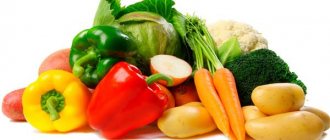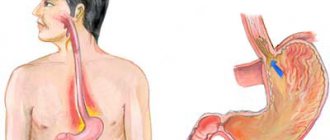Types of stomach diseases and their signs
The gastrointestinal tract system consists of different organs that take part in the processes of swallowing, digesting, and assimilating food. After chewing food, it enters the pharynx, then the esophagus, stomach, intestines, and colon. And also in the digestion of food, working organs such as the pancreas, gallbladder, liver, kidneys, and adrenal glands are involved. Problems in the functioning of one or more of these organs can lead to the development of serious pathologies and diseases.
According to statistics, men are more susceptible to gastrointestinal diseases. This is due to bad habits, especially alcohol abuse, the habit of going to the doctor too late, when the stomach does not work at all.
Common gastroenterological diseases include:
- Ulcer of the stomach and duodenum. Involves injury to the mucous membrane, severe inflammation caused by an increase in the amount of acid and bile. Abdominal pain with a peptic ulcer can be felt in different places, but more often they are in the center of the abdomen - around the navel, under the left and right ribs.
- Gastritis. With this disease, the stomach “digests itself”: due to inflammation, the amount of gastric juice decreases and acidity increases. If treatment is not started in time, erosions appear on the mucous membrane - erosive gastritis begins to develop.
- Polyposis. Polyps are benign formations located on the inner wall of the stomach. The disease is rare and is more common in men aged 45–50 years and older. Polyps are located either in the pyloric region of the stomach or inside it.
- Cancer. One of the dangerous, fatal diseases, the exact causes of which are still being studied. There are 4 stages of the disease; when the last stage is detected, the patient lives no more than a few years. Only when cancer is diagnosed at the initial, zero stage, a favorable treatment prognosis awaits 90% of patients.
Doctors have proven that ulcers, chronic gastritis and polyps sometimes serve as fertile ground for the development of stomach cancer. In themselves, all of the above gastrointestinal diseases are dangerous, so you cannot decide what to do on your own. Only the attending gastroenterologist can determine how to cure the disease, or, if it is chronic, stop its development.
Types of Intestinal Disorders
All inflammatory phenomena can affect one or several parts of the intestine at once. Each of these inflammatory processes, which are localized in one or another part of the intestine, has its own name. There are nine types of diseases in total:
- Enteritis - localization in the small intestine.
- Duodenitis or inflammation of the duodenum;
- Eunit.
- Ileitis is inflammation of the ileum.
- Typhlitis.
- Appendicitis.
- Colitis is inflammation of the colon.
- Sigmoiditis is localized in the sigmoid region.
- Proctitis is inflammation of the rectum.
Inflammatory processes in any of these types of diseases cause a reaction on the mucous membrane. It becomes swollen and also produces pus or blood clots. In particularly severe cases, ulcers appear in the intestinal walls and begin to bleed.
In addition, there are other rare cases in which a through hole appears in the intestinal wall. This phenomenon threatens the intestinal contents entering the abdominal cavity, which will cause complications of the disease. Such holes in the intestine will subsequently cause inflammation of the peritoneum - peritonitis.
The role of folk remedies
If you use folk recipes as part of complex therapy, they will help cope with the main symptoms of inflammation. These include:
- disorders, problems with stool;
- indigestion – problems with digestion of food;
- nausea, vomiting;
- heartburn;
- flatulence;
- unpleasant odor from the stomach, unpleasant tastes in the mouth;
- weight loss;
- stomach ache;
- deterioration of general condition.
The goal of therapy for gastrointestinal diseases is to restore the gastric mucosa. With an ulcer, this is completely impossible to do, since it is a chronic disease. And with gastritis or a similar disease - cardia insufficiency, you can completely stop the inflammatory process.
Folk remedies are recommended for use in cases of congenital pathologies of the stomach, for example, prolapse. Following a diet and using traditional recipes will help avoid the onset of inflammatory processes and the development of pathological changes.
Causes of gastrointestinal diseases
All intestinal diseases arise from several causes. The more provoking factors affect the intestines, the more difficult the disease progresses and the worse the problem is treatable.
Mechanisms that trigger inflammation
If a person has any provoking phenomena, then the risk of intestinal diseases increases. The following factors play a major role in the emergence of pathological processes:
- heredity;
- unbalanced diet;
- various types of stress;
- smoking and drinking alcohol;
- viral and bacterial intestinal infections;
- taking certain medications.
Types of inflammatory processes
The majority of all intestinal disorders are caused by inflammatory processes. In turn, inflammation can be of a different nature and is divided into the following types:
- acute process;
- aseptic;
- infectious process;
- chronic.
Popular folk recipes
Treatment of the stomach with folk remedies would be appropriate for gastritis, gastric or duodenal ulcers, cardia insufficiency, and diseases preceding these. You need to choose a recipe based on your own preferences, capabilities, and your body’s tolerance of the selected products. The most effective folk methods, according to those who have experienced them, are given below.
Potato juice
It has anti-inflammatory, wound-healing and anesthetic effects, suitable for the treatment of inflammatory diseases of the gastrointestinal tract with high acidity. You can use it in several ways:
- We pass the peeled, washed potatoes through a juicer. Take 20 g of juice one hour before meals three times a day. The next week, a single serving of juice is increased to 40 g and so on up to 100 g. Then a break is taken for a month, after which the course can be repeated.
- We pass the potatoes through a juicer, separately the carrots. We take the juices of both vegetables in equal quantities - 100 g each, mix, drink in the morning on an empty stomach. You can have breakfast no earlier than an hour later.
If you don’t have a juicer, you can grate the potatoes on a fine grater, then strain through a sieve or cheesecloth.
Potato juice has an unpleasant odor. If it is very difficult to take, you can add a little honey to the glass.
Cabbage juice
The advantage of this folk remedy is that the raw materials for its preparation are available at any time of the year. Suitable for patients with low acidity. It is recommended to take a glass of freshly squeezed juice per day. After the drink is squeezed out, it must be strained to avoid lumps, and heated to a temperature of about 40 degrees.
The drug is taken twice a day - before breakfast on an empty stomach, a few hours before dinner. Many people find it convenient to prepare the drink the night before, squeezing a glass of juice at once for two doses. The shelf life of cabbage drink is 24–36 hours. After this, the beneficial properties are lost.
Propolis
Propolis is a beekeeping product that is widely used in folk medicine, including in the treatment of diseases of the digestive system. It is suitable for people with any acidity, having anti-inflammatory, soothing, softening effects.
There are many recipes based on propolis; according to those who have experienced them, the recipe with butter is highly effective. To prepare, take 100 g of butter, melt, but do not bring to a boil. Remove from heat, add 10 g of propolis, place in a water bath until the mixture becomes homogeneous.
The product is taken three times a day, an hour before meals, 1 tsp. It is recommended to mix the propolis mixture with butter and milk, warming it to room temperature. You can also add a little honey for taste. All these ingredients are able to envelop the inflamed mucous membrane, providing a calming effect.
Gooseberry leaves
They are especially effective in the complex treatment of esophageal hernia, which is most often encountered by older people. At their age, many medications and even folk remedies may be contraindicated. The use of a decoction based on gooseberry leaves has one contraindication - individual intolerance.
To prepare the decoction, it is better to prepare gooseberry leaves in advance. During the season, you can prepare raw materials for a year in advance, especially since the course of treatment can be repeated periodically. Take 1 tbsp. l. dry crushed leaves, pour 0.5 liters of boiling water, bring to a boil, leave for several hours, filter. The entire prepared dose should be divided into 4 doses during the day. The decoction is taken an hour before meals.
St. John's wort
Due to its therapeutic effects, this plant is known as a natural antibiotic. For gastritis and stomach ulcers, its properties such as wound healing, anti-inflammatory, and bactericidal are especially valuable.
The following plant-based recipes are considered effective:
- Infusion with boiling water. Take 40 g of dry St. John's wort (pharmaceutical will do), brew it in 0.5 liters of boiling water, leave it to steep in a thermos overnight. In the morning, strain the drink, take 50 ml during the day, an hour before meals, before each meal. Every day you need to brew a fresh infusion.
- With butter. This recipe requires only a fresh plant, so it can only be prepared when it is in season. We wash the St. John's wort under running water, chop it finely, and place it in a glass jar without compacting it. Pour olive oil into it, close the lid, and send it to a dark place for 10 days. Take 1 tbsp of strained oil. l. an hour before meals three times a day.
The flowering period of St. John's wort is summer, the stems should be cut no longer than 25–30 cm, the rough base should remain.
In this and other recipes, you can replace olive oil with regular unrefined sunflower oil. However, olive oil contains more nutrients.
Precautions when treating at home
Various substances, herbs, foods and other folk remedies for stomach pain should be used with caution.
If negative sensations occur, you should not treat yourself for more than three days. If the alarming symptoms do not subside or their cause is unclear, you should call a doctor as soon as possible. Any pathology of the digestive system quickly becomes chronic or even ends in severe complications.
Even if home recipes have helped, you should undergo a full examination by a specialist to make sure that the disease has not reached the acute stage and does not threaten the patient with serious consequences.
Diet
Without following a diet, treatment of any gastrointestinal diseases will not be successful. To correctly give nutritional recommendations, the doctor takes into account the level of acidity, which influences the choice of permitted and prohibited foods.
If you are diagnosed with high acidity, you must follow these dietary recommendations:
- vegetables are allowed only baked, stewed, boiled, but not raw;
- Citrus fruits and all sour fruits are prohibited;
- Do not consume fermented milk products;
- Only wheat bread, stale, is allowed.
With low acidity, the menu is more gentle:
- All fruits and vegetables in any form are allowed (fresh cabbage, onions, garlic, beans are limited);
- you can consume low-fat dairy products;
- bread is allowed on any basis, only stale.
The principles of nutrition are similar to diseases of the gastrointestinal tract with any acidity: you need to eat in fractional portions, but often, avoid fatty, fried, spicy, salty, smoked foods. The ban especially applies to fast foods and semi-finished products. Such a gentle attitude towards the mucous membrane of the stomach and other organs of the gastrointestinal tract will relieve them of excessive stress and promote the healing of erosions.
Sometimes zero acidity is diagnosed - a serious pathology that is extremely rare. In this case, the attending physician will prescribe therapy and diet on an individual basis.
Reviews
Elena I have been suffering from stomach ulcers for several years now, I know that I need to follow a diet, but sometimes I still break down. The aggravation begins immediately, but I already know what to do. In addition to the pills, I start drinking freshly squeezed potato juice before meals, three times a day. I start with 20 g, constantly increasing to 100 g. Within a month, the unpleasant symptoms of exacerbation disappear, although I feel relief immediately. I developed gastritis during my student years due to unhealthy food and habits. Now I regret it, but I can’t do anything, the disease is chronic. But I have learned to prevent flare-ups. I prepare a mixture of propolis and butter. Abdominal pain and nausea disappear within a few days. Of course, this does not replace pills, but it helps to at least sometimes do without them.











